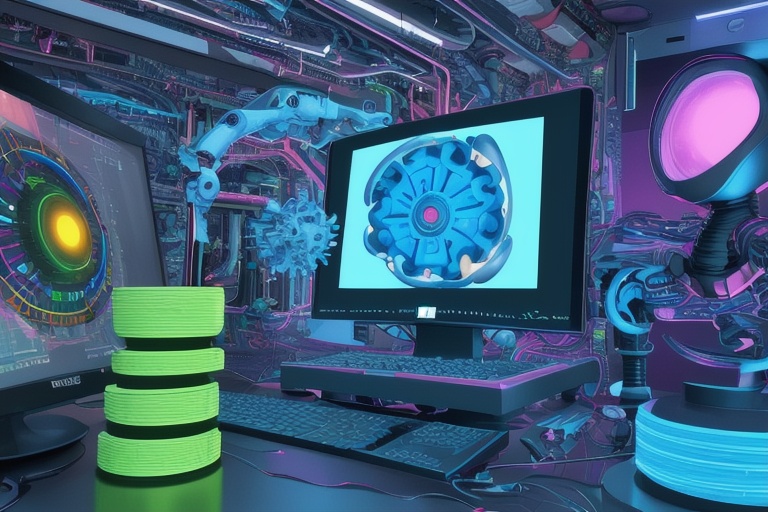Artificial Intelligence (AI) has evolved from the imaginative storytelling of the 20th century's science fiction into a promising and dynamic field that is revolutionizing our world. The initial fascination with intelligent automatons has transcended speculative narratives and laid down a scientific pursuit that began seriously taking shape in the mid-20th century. Interest among scholars in various disciplines surged, focused on the potential of machines performing cognitive functions similar to a human brain.
Artificial Intelligence (AI) has evolved from the imaginative storytelling of the 20th century's science fiction into a promising and dynamic field that is revolutionizing our world. The initial fascination with intelligent automatons has transcended speculative narratives and laid down a scientific pursuit that began seriously taking shape in the mid-20th century. Interest among scholars in various disciplines surged, focused on the potential of machines performing cognitive functions similar to a human brain.
The Foundations of AI
Pioneers such as Alan Turing, a figure now synonymous with the early concept of artificial intelligence, paved the way with substantial contributions to the mathematical backings of AI. Turing's famed question—"Can machines think?"—and subsequent Turing Test challenged the boundaries of machine capability, suggesting that information processing and reasoning were definitively within reach for non-biological entities.
Moreover, the 1950s witnessed the birth of AI as a formal discipline. The creation of the Logic Theorist, considered the first AI program, in 1956 by Allen Newell, Herbert A. Simon, and Cliff Shaw, served as one of the earliest demonstrations that machines could mimic complex human problem-solving behavior. The program was designed to mimic the problem-solving skills of a human and became a foundational stone in the building of AI as we know it today.
Advancements and Growth
Between the late 1950s and the mid-1970s, AI research took strides in expanding computational power, refining machine learning algorithms, and enhancing problem-solving techniques. This period is often referred to as the "golden age" of AI, with the term "artificial intelligence" being coined during the Dartmouth Summer Research Project on Artificial Intelligence in 1956, catalyzing the momentum in the field.
During these two decades, AI benefitted from favorable funding and heightened interest, establishing itself as a promising aspect of technological progress. These years were hallmarked by the optimization of algorithms and creative exploration into the facets of machine intelligence.
Challenges and Stagnation
However, AI's rapid ascent encountered barriers, particularly in computational limitations and funding shortages. The AI winter, a term used to describe these periods of decline, was marked by skepticism, resulting in cutbacks in investments and a waning of research activities.
Resurgence and Evolution
The 1980s sparked a revival with the advent of new methods like deep learning and the emergence of expert systems designed to simulate the decision-making ability of human experts. The introduction of these technologies, along with a resurgence of financial backing, pushed AI back to the forefront of scientific breakthroughs.
The renewal of interest in AI propelled the field into a new era of innovation. Expert systems found their way into various sectors, providing specialized knowledge and advice to non-experts. Deep learning, a subset of machine learning involving neural networks that mimic the human brain's structure and function, continues to ignite transformative changes across industries.
Present and Future Outlook
Today, the landscape of AI is vast and full of potential. AI's trajectory has shaped every facet of technology, infiltrating everyday life, and fundamentally altering how we interact with the world around us. Innovations in programming, artificial intelligence, and machine learning are not just milestones but everyday occurrences that que up the next era of evolution in this exciting field.
The AI Impact
The implications of AI advancements are profound, with applications ranging from autonomous vehicles, healthcare diagnostics, facial recognition, and personalized digital assistants, to large-scale data analysis and beyond. The impact on programming is equally significant, with AI altering how software is developed, deployed, and maintained. This 'intelligent' programming paradigm promises smarter, more efficient software solutions.
Embracing the AI Revolution
As AI continues to mature, the coming years are anticipated to usher in even more spectacular innovations and disruptive technologies. While the pursuit of artificial general intelligence—the creation of machines with the full multifaceted intelligence of a human—remains an ongoing challenge, the progress thus far points towards a future where AI could fundamentally redefine what is possible.
The journey of AI from its conceptual infancy to its current state as a transformative technological movement demonstrates the remarkable adaptability and ambition of human ingenuity. The story of AI is not one of linear progression but an epic narrative filled with ups and downs, triumphs, and challenges. As we peer into AI's future, it is with the anticipation of new breakthroughs, each building upon the last, to create a world where intelligent machines enhance human capabilities and drive progress in ways yet to be imagined.
Information for this article was gathered from the following source.




